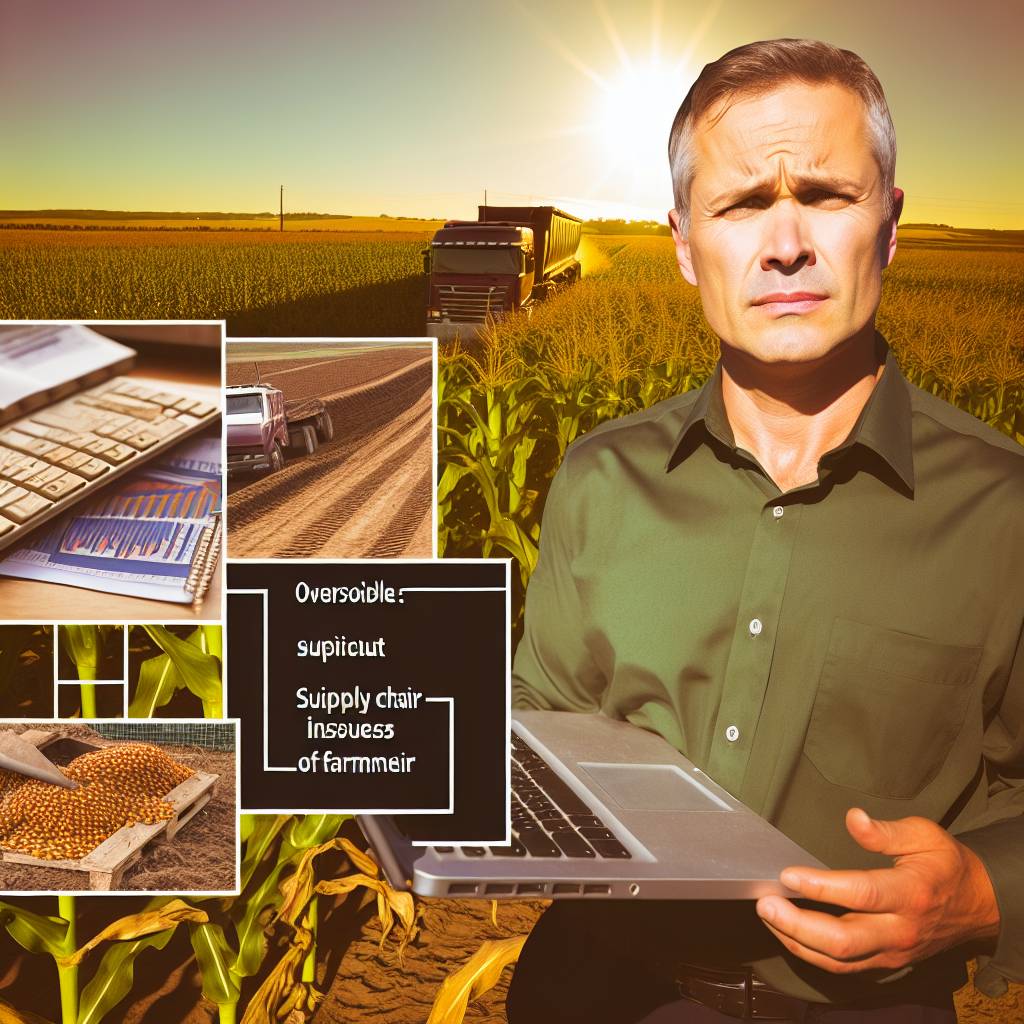Introduction to Supply Chain Challenges in Farming
The farming industry faces numerous supply chain challenges today.
These challenges significantly impact agricultural efficiency and productivity.
Climate change introduces unpredictability into farming operations.
Weather extremes can disrupt planting and harvesting schedules.
Logistical issues arise from transporting goods to the market.
Additionally, market demand often fluctuates unexpectedly.
As a result, farmers struggle to adjust their production levels.
Moreover, technology adoption remains uneven in the agricultural sector.
This unevenness can hinder effective supply chain management.
Labor shortages further complicate these challenges.
Many farmers find it difficult to recruit and retain skilled workers.
Consequently, these labor issues can delay critical operations.
Supply chain transparency is essential for overcoming these obstacles.
Understanding where products originate can foster trust within the market.
Farmers and suppliers must work together to strengthen their networks.
Transform Your Agribusiness
Unlock your farm's potential with expert advice tailored to your needs. Get actionable steps that drive real results.
Get StartedDeveloping strategic partnerships can enhance resource allocation.
Furthermore, utilizing data analytics can help anticipate challenges.
Incorporating technology will streamline operational processes.
This proactive approach allows farmers to adapt more efficiently.
Ultimately, addressing these supply chain challenges is crucial.
Enhancing agricultural sustainability ensures food security for future generations.
Identifying Key Supply Chain Issues: A Farmer’s Perspective
Understanding Supply Chain Dynamics
Farmers face multiple challenges in managing their supply chains.
These challenges often affect production efficiency and profitability.
The complexities of supply chains can create delays in sourcing materials.
Additionally, unpredictable weather can disrupt timely deliveries.
Common Supply Chain Disruptions
Several common issues hinder effective supply chain management.
First, fluctuating prices for raw materials can strain budgets.
Second, transportation delays can lead to spoiled goods.
Moreover, a lack of transparency often complicates problem-solving efforts.
Coping with Seasonal Variability
Seasonal fluctuations greatly impact farming operations.
Peak seasons often lead to supply shortages and increased demand.
In contrast, off-seasons can result in excess inventory.
Farmers must develop strategies to manage these cycles effectively.
Technology’s Role in Supply Chain Efficiency
Implementing technology can streamline supply chain processes.
For instance, farm management software enhances visibility.
Furthermore, precision agriculture tools optimize resource allocation.
Adopting these technologies can ultimately improve production quality.
Building Stronger Relationships with Suppliers
Establishing solid partnerships with suppliers is crucial.
Clear communication fosters trust and collaboration.
Showcase Your Farming Business
Publish your professional farming services profile on our blog for a one-time fee of $200 and reach a dedicated audience of farmers and agribusiness owners.
Publish Your ProfileRegularly evaluating supplier performance helps identify areas for improvement.
Additionally, diversifying suppliers mitigates risks associated with dependency.
Sustainability and Ethical Sourcing
Sustainability issues increasingly influence supply chains.
Consumers demand ethically sourced products that minimize environmental impact.
Farmers should adopt sustainable practices within their supply chains.
This approach not only meets consumer demand but also enhances brand loyalty.
Effective Inventory Management Strategies for Farmers
Understanding Inventory Management
Inventory management plays a crucial role in farming operations.
It ensures that farmers maintain adequate stock levels.
This practice minimizes waste and maximizes efficiency.
Utilizing Technology for Tracking
Adopting technology streamlines inventory tracking processes.
Farmers can use software to monitor stock levels in real-time.
Mobile applications offer on-the-go access to inventory data.
This accessibility enhances decision-making capabilities.
Implementing Just-In-Time Practices
Just-in-time inventory management reduces holding costs.
This method encourages timely ordering and delivery of supplies.
Consequently, it minimizes the amount of unsold product.
Farmers can better manage resources with this approach.
Regular Inventory Audits
Conducting regular inventory audits is vital for accuracy.
These audits help identify discrepancies in stock levels.
Furthermore, they promote accountability among team members.
Audit schedules can be weekly or monthly, based on needs.
Creating Forecasting Models
Accurate forecasting models support effective inventory management.
Farmers can analyze past sales data to predict future needs.
Seasonal trends play a significant role in these forecasts.
Adjustments to stock levels become simpler with good forecasting.
Training Employees on Best Practices
Employee training is essential for inventory management success.
Workers should understand how to track and manage inventory.
Regular workshops can enhance skills and knowledge.
This initiative ultimately leads to improved efficiency.
Scaling Inventory Management
As farms grow, inventory management systems must scale accordingly.
Investing in adaptive software solutions can facilitate this growth.
These systems should accommodate increasing product lines.
This flexibility prepares farmers for future market demands.
Delve into the Subject: Niche Markets and Opportunities for Farm Diversification
Building Strong Relationships with Suppliers and Distributors
Importance of Trust and Communication
Trust forms the foundation of successful supply chain relationships.
Open communication channels foster collaboration and transparency.
Regular check-ins can help address concerns promptly.
This proactive approach creates a mutually beneficial partnership.
As a result, both parties can adapt to challenges effectively.
Choosing the Right Partners
Selecting reliable suppliers is crucial for farm operations.
Showcase Your Farming Business
Publish your professional farming services profile on our blog for a one-time fee of $200 and reach a dedicated audience of farmers and agribusiness owners.
Publish Your ProfileEvaluate potential partners based on their track record.
References and testimonials can provide valuable insight.
Moreover, align your goals with those of your suppliers.
This alignment strengthens the commitment between partners.
Negotiating Fair Terms
Fair negotiations lead to stronger supplier relationships.
Discuss pricing, delivery schedules, and quality expectations openly.
Clearly defined terms set the stage for future cooperation.
Flexibility in negotiations can also yield positive results.
You may explore various solutions that benefit both sides.
Utilizing Technology for Enhanced Collaboration
Technology plays a vital role in modern supply chain management.
Utilize digital platforms for real-time communication updates.
For instance, shared software tools streamline order processing.
This technology enhances efficiency and reduces errors.
Additionally, it can contribute to better inventory management.
Continuous Improvement and Feedback
Regular feedback loops cultivate lasting supplier relationships.
Request input on processes and performance from your partners.
This dialogue encourages ongoing improvement and innovation.
Furthermore, celebrate successes to reinforce positive behaviors.
A culture of continuous improvement benefits all stakeholders.
See Related Content: Streamlining Agricultural Supply Chains for Greater Profit
Leveraging Technology: Tools for Streamlining the Supply Chain
Importance of Technology in Farming
Technology plays a vital role in modern farming operations.
It enhances efficiency and reduces waste throughout the supply chain.
By adopting new tools, farmers can significantly improve their yield.
Inventory Management Systems
Implementing inventory management systems is crucial for effective farming.
These systems track stock levels in real-time.
They help farmers avoid overstocking or stockouts.
Moreover, they provide insights for better forecasting and planning.
Data Analytics Tools
Data analytics tools allow farmers to make informed decisions.
They collect and analyze data from various sources.
This data helps identify trends and optimize operations.
Furthermore, predictive analytics can forecast potential issues.
Supply Chain Management Software
Supply chain management software streamlines logistics operations.
This software coordinates processes from production to delivery.
It reduces delays and enhances communication across the network.
Consequently, farmers can provide fresher products to consumers.
Precision Agriculture Techniques
Precision agriculture employs technology to monitor and manage crop production.
Tools like GPS and drones provide real-time data on field conditions.
Farmers can apply resources more efficiently with these insights.
As a result, they achieve higher productivity and lower costs.
Collaboration Platforms
Collaboration platforms enhance communication among supply chain participants.
Showcase Your Farming Business
Publish your professional farming services profile on our blog for a one-time fee of $200 and reach a dedicated audience of farmers and agribusiness owners.
Publish Your ProfileThey allow farmers to connect with suppliers, distributors, and retailers.
Such connections facilitate quicker decision-making and problem-solving.
Ultimately, effective collaboration leads to smoother operations.
Gain More Insights: Best Practices for Supply Chain Management in Agribusiness

Implementing Sustainable Practices to Enhance Supply Chain Resilience
Understanding Sustainable Practices
Sustainable practices form the backbone of resilient supply chains in farming.
They promote environmental health and economic stability.
Furthermore, they enhance the quality of food produced.
Integrating Technology
Farmers can leverage technology for better efficiency.
For instance, precision agriculture helps optimize resources.
Using drones allows for real-time monitoring of crops.
Additionally, data analytics improves decision-making processes.
Collaboration with Local Suppliers
Building strong relationships with local suppliers enhances resilience.
Such collaboration fosters shared knowledge and resources.
Moreover, it reduces transportation costs and carbon footprint.
Local partnerships strengthen community ties among farmers.
Diverse Crop Rotation
Diverse crop rotation mitigates the risk of crop failure.
This practice enhances soil fertility and reduces pest outbreaks.
Furthermore, it fosters a balanced ecosystem around the farm.
Adopting Water Conservation Techniques
Implementing water conservation techniques is crucial for sustainability.
Farmers can utilize drip irrigation to minimize water wastage.
Rainwater harvesting systems also capture valuable resources.
These methods ensure a reliable water supply during dry periods.
Educating Farmers and Workers
Education plays a fundamental role in sustainable farming.
Training sessions increase awareness of sustainable practices.
Moreover, workshops promote innovative techniques among farmers.
This knowledge fosters a culture of sustainability within communities.
Measuring and Monitoring Impact
Farmers should continuously measure their sustainability efforts.
Regular assessments help identify areas for improvement.
Utilizing key performance indicators allows for better tracking.
This ensures ongoing commitment to sustainability in farming.
Gain More Insights: Risk Management Techniques For Stable Agricultural Operations
Case Studies: Successful Supply Chain Solutions from Innovative Farms
Improving Inventory Management
Willow Creek Farms faced significant inventory challenges last year.
To address this, they implemented a real-time tracking system.
The new system offered accurate data for decision-making.
This change helped reduce excess stock and waste.
As a result, Willow Creek Farms improved its overall efficiency.
Enhanced Transportation Logistics
Green Meadow Organics struggled with transportation inefficiencies.
They partnered with local logistics companies to enhance delivery operations.
By using route optimization software, they cut down delivery times.
Consequently, customer satisfaction increased significantly.
Showcase Your Farming Business
Publish your professional farming services profile on our blog for a one-time fee of $200 and reach a dedicated audience of farmers and agribusiness owners.
Publish Your ProfileThis successful collaboration benefited both the farm and local businesses.
Utilizing Technology for Data Analysis
Springfield Farms adopted advanced data analytics tools last season.
This enabled improved forecasting and demand planning.
The team analyzed crop yield data more effectively.
Subsequently, they made informed decisions about crop rotation.
The implementation led to a significant increase in productivity.
Building Stronger Supplier Relationships
Clearview Orchards faced challenges with supplier reliability.
They focused on building stronger, long-term partnerships with suppliers.
This included regular communication and feedback loops.
The farm also involved suppliers in the planning process.
As a result, they achieved more consistent quality and supply levels.
Implementing Sustainable Practices
Harmony Fields took a unique approach by emphasizing sustainability.
They integrated sustainable practices into their supply chain strategy.
This helped reduce environmental impact while maintaining profitability.
The farm’s commitment attracted environmentally-conscious consumers.
In turn, sales increased alongside positive brand reputation.
Future Trends in Agriculture Supply Chain Management
Embracing Technology
Technology continues to reshape the agricultural supply chain landscape.
Farmers increasingly utilize drones for crop monitoring.
Moreover, precision agriculture improves efficiency and yield.
Artificial intelligence enhances forecasting and decision-making.
Additionally, blockchain technology ensures traceability and transparency.
Sustainable Practices
Sustainability remains a critical focus for farming operations.
Farmers are adopting eco-friendly practices to reduce waste.
Regenerative agriculture promotes soil health and biodiversity.
Furthermore, sustainable packaging solutions minimize environmental impact.
Many supply chains now emphasize local sourcing to reduce carbon footprints.
Collaboration and Partnerships
Collaborative efforts among stakeholders drive efficiency in supply chains.
Farmers partner with tech companies to access innovative solutions.
Networking with distributors enhances product reach and market access.
Additionally, partnerships with research institutions foster innovation.
This collaborative approach leads to shared knowledge and resources.
Consumer Demand for Transparency
Consumers increasingly demand transparency in food sourcing.
Supply chains must provide information about product origins.
This trend supports ethical consumerism and responsible purchasing.
Traceability technologies help meet these consumer expectations.
Furthermore, brands that prioritize transparency often gain consumer trust.
Adoption of Digital Platforms
Digital platforms streamline operations within the agricultural supply chain.
Farmers leverage e-commerce solutions to reach broader markets.
Online marketplace models enhance buyer-seller interactions.
Supply chain management software optimizes inventory and logistics.
Showcase Your Farming Business
Publish your professional farming services profile on our blog for a one-time fee of $200 and reach a dedicated audience of farmers and agribusiness owners.
Publish Your ProfileConsequently, these platforms improve overall productivity and profitability.
Additional Resources
Increasing Traceability in Agricultural Supply Chains | World …
USDA Agri-Food Supply Chain Assessment: Program and Policy …




